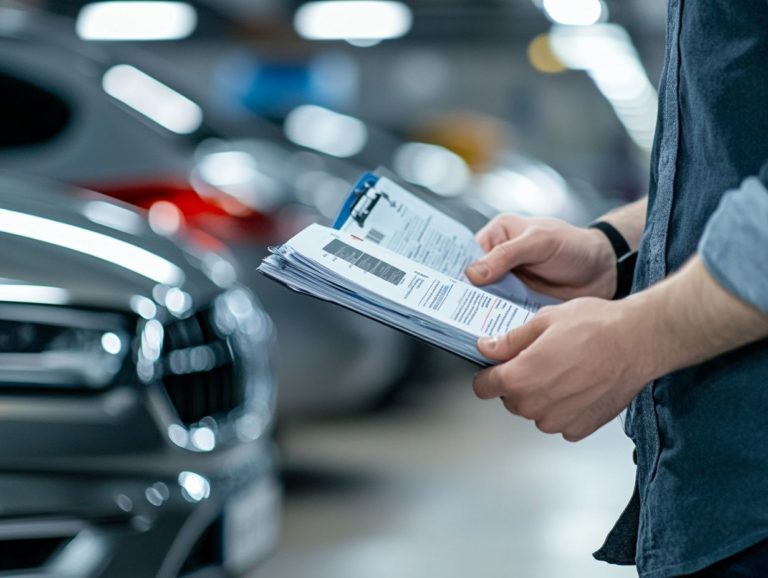How to Handle Used Car Returns
Buying a used car is thrilling. However, it can also be intimidating, especially with the possibility of needing to return it.
Understanding what qualifies as a used car return, along with your consumer rights and the legal safeguards in place, can truly transform your experience.
This article explores common reasons for returns, offers guidance on navigating the process effectively, and provides valuable tips to help you avoid issues altogether.
Get informed and confidently navigate the used car market. Your dream car is waiting!
Contents
- Key Takeaways:
- Understanding Used Car Returns
- Consumer Rights and Protections
- Reasons for Used Car Returns
- Handling a Used Car Return
- Preventing Used Car Returns
- Frequently Asked Questions
- 1. What is the process for handling a used car return?
- 2. Can I return a used car if I am not satisfied with it?
- 3. Will I receive a full refund for a returned used car?
- 4. What should I do if I find a problem with the used car after purchasing it?
- 5. Are there any fees associated with returning a used car?
- 6. Can I return a used car if it has been in an accident?
Key Takeaways:

- Know your consumer rights and legal protections before handling a used car return.
- Document any issues and contact the seller when dealing with a used car return.
- To prevent returns, thoroughly research and inspect a car before buying, and consider purchasing from a reputable dealership.
Understanding Used Car Returns
Understanding used car returns is essential as you navigate the intricate landscape of the automotive industry, especially regarding the diverse return policies established by car dealerships.
When a vehicle purchase falls short of your expectations, you may face car problems or doubts about the purchase while questioning your rights.
Each state has its own unique laws governing returns, which can include specific provisions under federal law. Resources like the Better Business Bureau provide valuable guidelines, and obtaining a vehicle history report can significantly shape your return experience.
What Constitutes a Used Car Return?
A used car return can occur for various reasons, such as buyer’s remorse or persistent car problems shortly after driving off the lot.
You may wrestle with the consequences of your choice, especially if the vehicle isn’t performing as you hoped. Mechanical issues can jeopardize your safety and lead to hefty repair bills, ultimately tarnishing your satisfaction with the purchase.
When faced with these unexpected challenges, it s understandable to consider the dealership s return policy, which can differ greatly from one place to another. Understanding the nuances of this policy is essential for navigating the return process smoothly, as it outlines the timelines and conditions under which you can return the vehicle.
Consumer Rights and Protections
Consumer rights and protections are crucial when you re in the market for a vehicle, particularly with lemon laws designed to shield you from defective products.
Both federal and state laws work together to ensure that you have options available should you encounter significant car problems or other valid complaints.
Resources from organizations like the National Association of Consumer Advocates and the Consumer Financial Protection Bureau can be invaluable as you navigate these complex regulations. In more severe situations, it s wise to consult an attorney who specializes in automotive law, ensuring that your interests are protected.
Lemon Laws and Other Legal Safeguards

Lemon laws are important rules that protect you if a car you bought has serious problems.
These laws can vary from state to state, but they generally define a ‘lemon’ as a vehicle with serious defects that impact its use, value, or safety. To qualify for lemon law protections, your vehicle typically needs to have undergone multiple repair attempts within a specific timeframe often within the first year or under a certain mileage.
Warranty coverage is also key here, as it outlines what manufacturers must fix without charging you. It s important to note that while federal lemon law provides a general framework, each state has its own definitions and procedures for filing claims. This highlights the necessity of understanding the local regulations that apply to your situation.
Reasons for Used Car Returns
Understanding the reasons behind used car returns is essential for both consumers and dealerships. It highlights common issues like mechanical failures and buyer’s remorse.
Recognizing these factors allows you to navigate the complexities of the market more effectively. This ensures smoother transactions and greater satisfaction.
Common Issues and Complaints
Common issues and complaints often arise from undisclosed mechanical problems that surface after the purchase. This underscores the critical importance of a thorough vehicle history report.
You may find yourself facing unexpected repairs shortly after acquiring your vehicle. These repairs often result from hidden issues that a quick inspection doesn’t uncover. This situation can lead to frustration and a sense of betrayal, especially when you were assured of the car’s reliability.
Used car lots often prioritize profit margins, sometimes opting for quick sales at the expense of long-term customer satisfaction. This can further obscure the true condition of the vehicles.
Conducting detailed inspections and ensuring transparency about a car’s past especially through comprehensive vehicle history reports is essential for enabling you to make informed decisions. This proactive approach ultimately reduces the likelihood of mechanical headaches in the future.
Handling a Used Car Return
Navigating the return of a used car can be intricate, demanding a thorough understanding of the dealership’s return policy as well as your rights as a consumer. It’s essential to be aware of the details, including the potential for contract cancellation under certain conditions.
Steps to Take and Important Considerations

In terms of handling a used car return, you need to follow essential steps and consider important factors that can greatly influence the outcome of your return process.
- Review the dealership’s return policy; it lays the groundwork for what you can anticipate.
- Familiarize yourself with your state’s cooling-off rules, as these may allow you to cancel the purchase within a specific timeframe.
- If you face obstacles or disagreements during the return, know when to seek legal advice, especially if there are significant financial stakes involved.
- Keep all paperwork organized, document communications, and maintain a composed demeanor to enhance your chances of a smooth return.
By following these practical steps, you can make a smoother resolution more attainable.
Preventing Used Car Returns
Preventing used car returns begins with making informed buying decisions. It’s essential to select a reliable used car, and utilizing tools such as a vehicle history report can help you navigate potential pitfalls effectively.
Tips for Buying a Reliable Used Car
When you’re in the market for a reliable used car, it’s essential to follow certain tips that can lead to a satisfying purchase. Start by checking the vehicle history report and considering certified pre-owned cars.
A thorough inspection by a trusted mechanic is paramount; it can unveil any hidden issues that may not be immediately visible. Pay close attention to the car s mileage and maintenance records, as these details provide valuable insight into its overall condition and longevity.
Exploring certified pre-owned vehicles can elevate your buying experience. These cars often come with warranties and have undergone rigorous inspections. By taking these steps, you will find a dependable vehicle and enjoy peace of mind throughout the purchasing process.
Frequently Asked Questions
Got questions? Here are some common ones we hear from buyers like you!
1. What is the process for handling a used car return?

The return process may vary by dealership or seller. Generally, you ll fill out a return form, show proof of purchase, and discuss why you want to return the car.
2. Can I return a used car if I am not satisfied with it?
Yes, many sellers have return policies for used cars. Always read the return terms carefully some may have restrictions or time limits.
3. Will I receive a full refund for a returned used car?
Your refund will depend on the seller s policy. Some may give a full refund while others might offer partial refunds or store credit.
4. What should I do if I find a problem with the used car after purchasing it?
Contact the seller right away if you find a problem. They might repair it, let you exchange it for another car, or offer a refund.
5. Are there any fees associated with returning a used car?
Fees depend on the seller’s return policy. Some might charge a restocking fee or require you to pay for shipping the car back, so check ahead.
6. Can I return a used car if it has been in an accident?
This depends on the seller’s policy and the damage level. Some sellers won t accept returns for accident-damaged cars, so be sure to know their rules before you buy.






